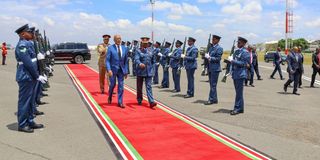Premium
Haitian PM lands in Kenya in fresh push to send 1,000 police officers

Haitian Prime Minister Ariel Henry lands in Nairobi to push for Kenyan police deployment.
What you need to know:
- President William Ruto on Thursday, February 29 met Haitian Prime Minister Ariel Henry and pledged to offer the "experience and expertise".
- Dr. Ruto had offered 1,000 police officers to lead the multinational force in Haiti.
President William Ruto on Thursday met Haitian Prime Minister Ariel Henry and pledged to offer the "experience and expertise" of Kenya's police force to the troubled Caribbean nation.
The head of state said Kenya was joining hands with Haitians because of the common heritage.
"We are offering the experience and expertise of our police officers in the Multinational Security Support Mission in Haiti as mandated by the United Nations Security Council and guided by our courts," President Ruto said after meeting with the Haitian Prime Minister at State House in Nairobi.
The Prime Minister jetted into the country after the 46th Ordinary Meeting of Caribbean Community (CARICOM) Heads of State and Government held in Guyana on February 28.
Dr. Ruto had offered 1,000 police officers to lead the multinational force in Haiti. However, the High Court had blocked the deployment of Kenyan police to gang-ruled Haiti to help bring the situation under control.
Justice Chacha Mwita, in blocking the decision to send police to Haiti, argued that the National Security Council - headed by the president - lacked the authority to deploy regular police outside the country.
Under Kenyan law, Justice Mwita said, the authorities could only deploy officers abroad if there was a "reciprocal arrangement" with the host government.
"It is not disputed that there is no reciprocal arrangement between Kenya and Haiti and therefore there can be no deployment of police to that country," Mwita said.
Government spokesman Isaac Mwaura said the government would appeal the decision.
Haiti first appealed for help in 2022 as gang violence soared. But it was unable to find a nation willing to lead the security mission.
Last July, President Ruto said he was willing to send Kenyan police to help stem the deepening crisis.
The 1,000 Kenyan troops selected for the mission include teams from the Rapid Deployment Unit (RDU), Anti Stock Theft Unit (ASTU), General Service Unit (GSU), and Border Patrol Unit.
About two weeks ago, Haiti announced that it was working on an official agreement with Kenyan officials to secure the long-awaited deployment of police officers from Nairobi.
Reuters reported that the United Nations documented 4,789 people killed by gang violence in Haiti last year, a 119 percent increase from 2022, and that another 3,000 were kidnapped.
In mid-February 2024, a Kenyan police officer died in a hotel room in the US capital, Washington DC while on a reconnaissance mission to Haiti.
Chief Inspector Walter Nyankieya Nyamato was part of an advance security team dispatched to Haiti on a reconnaissance mission ahead of the planned deployment of the Kenyan peacekeeping force.
Mr Nyankieya, who was based at the Jogoo House police headquarters, was enroute to Haiti alongside several other colleagues.




